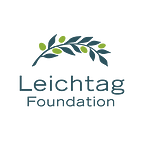What Passover Means in 2017
“…for you were strangers in the land of Egypt.”
Passover, the spring holiday that celebrates the Jewish people’s liberation from slavery to freedom, begins Monday night, April 10. We are looking forward to our seder dinners with friends and family and digging deep into Passover’s compelling themes.
Our philanthropic and programmatic work at Leichtag Foundation, particularly in 2017, reflects these themes with relevant and urgent opportunities for action. Here are some highlights.
5 Ways Your Passover Seder Can Change the World
We put together a nifty guide to elevate your seder and really make a difference this year.
Let all who are hungry come and eat…
Special foods eaten in specific ways help to ritualize and retell our collective history. We eat matzah, the “bread of affliction,” to remember how it feels to eat in displacement and insecurity. Yet, we know food insecurity occurs not just in refugee camps globally but among our neighbors as well: one in six people in San Diego do not know where their next meal is coming from. If you don’t understand the connection between what’s in our bellies and how it affects our minds, eat matzah for a week and get back to us.
Welcome the Stranger, for you were strangers in the land of Egypt
In the Passover story, Moses led the Israelites out of the land of Egypt, which is referred to as “Mizraim,” and translates to “narrow place.” We can interpret this as a broader, universal concept of bondage. Can the moral and lesson of the Israelites’ exodus be translated to all other peoples escaping the bondage of their “narrow place?”
In January 2017, the White House declared a travel ban that would bar refugees from entering the U.S. We were moved by the protests that erupted in airports here in San Diego and around the country, the generous lawyers who offered their free counsel, and even the people who held a Havdallah at NYC’s JFK airport.
We met with some of these refugees who were denied (at first) at the We Were Refugees, Too teach-in we held at Temple Emanu-El, a followup to our first educational panel “Immigrants & Refugees” at Congregation Beth El — and our feeling was a mix of joy, disbelief, embarrassment, and added motivation.
We were so moved by the response from these events. The first program “Immigrants & Refugees” was created in three days in collaboration (and with fierce urgency) by Leichtag Foundation, Jewish Family Service of San Diego, Jewish Federation of San Diego, and Anti-Defamation League (San Diego).
We saw the Jewish community and its allies in San Diego come together to pray with their feet — 800 for the first program on a Thursday night (with 3 days notice) and another 300 for the follow up. The gathering demonstrated a community living their values by standing with refugees: that we must “welcome the stranger” (written in the Torah no fewer than 36 times) and that “whoever saves a life, it is considered as if he saved an entire world.”
HIAS Seder Guide
The theme of displacement can create stimulating dialogue during our seders. HIAS, a national refugee resettlement agency with Jewish origins, offers a resource guide for your seder conversations. Use it, and let us know how it goes!
A Wave of Civic Engagement
The wave of civic engagement has been thrilling. We’ve been so inspired by the Seacrest seniors who live adjacent to Leichtag Commons in Encinitas who formed their own Women’s March in solidarity. Many from our staff and grantees who work in the North County Hub wanted to keep their spark alive, so they went next door and asked if they could get together and write postcards. Their story has inspired this entire community and beyond. They were featured on KPBS and now nationally in The Forward.
Lastly, we celebrate Passover just at the beginning of spring. Coastal Roots Farm is beginning to blossom, the vineyard’s buds are breaking, and renewals is happening all around us.
We all have a chance to renew, too. We hope for an abundant harvest (which will be donated around North County San Diego and also available at Sundays and Thursdays at the Farm Stand — which is Pay-What-You-Can/and accepts EBT), and we hope you will be part of this renewal with us.
We are excited for a very busy spring here at Leichtag Commons and we have lots of exciting projects in the pipeline coming to San Diego and Jerusalem. Chag same’ach, have a meaningful Passover, and we hope to see you all soon.
